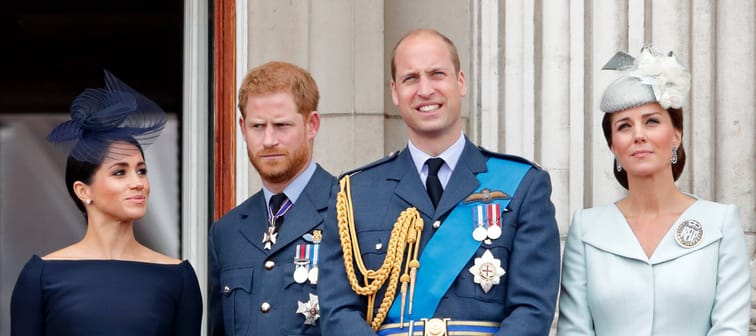Who will inherit Queen Elizabeth’s money?
King Charles inherited the throne after the queen’s passing and the bulk of her US$500 million estate. This included the royal family’s private estate, the Duchy of Lancaster, the queen’s personal assets and approximately 100 horses, according to reports published by The List.
The queen’s beloved Corgis went to live with Prince Andrew.
King Charles’ net worth vs the royal family’s net worth
At this point in time, King Charles’ net worth is now an estimated US$2.3 billion — only a fraction of what the royal family is worth.
Once King Charles ascended the throne, he passed on his private estate — the Duchy of Cornwall — to Prince William, along with the title, Duke of Cornwall. The estimated value of this estate is about US$1.3 billion. (Duchy translates to “duke’s lands.”)
This decision to pass on the estate to his oldest son is steeped in tradition — with each eldest son receiving the estate and the title. However, this effectively cut off Prince Harry, the youngest son of King Charles, and Prince Louis, the youngest son of Prince William, from the Duchy of Cornwall inheritance.
It’s unclear if Harry and Meghan inherited anything from the queen’s estate.
While it’s doubtful the royal family will make their inheritance squabbles public, their concerns about rights, equanimity and how to avoid family squabbles — are common estate planning problems.
Maximize Your Tax Refund with TurboTax Canada!
Simplify tax season with this user-friendly software. Get step-by-step guidance, maximize deductions, and file with confidence. Trusted by millions, TurboTax Canada ensures accuracy and peace of mind. Start your taxes today and get the refund you deserve
Get the tax refund you deserveQueen's estate and the royal family highlights the importance of estate planning
While the average Canadian’s estate may not include priceless jewels, prize-winning horses or precious works of art, there are still important lessons to be learned from how high-net-worth individuals (such as celebrities and members of the royal family) plan inheritance and estate disbursements.
Even those solidly in the middle-class income bracket can learn a thing or two about estate planning from the royal family. Sure, there may not be priceless jewels, prize-winning horses or precious works of art, but learning how to plan to take care of loved ones is key to leaving a legacy.
What is estate planning in Canada?
Estate planning is the process of deciding and arranging in advance what will happen to your money and any other assets when you die.
In the most basic form, estate planning includes documents such as a will, power of attorney and advance care directive — your wishes for end-of-life care (also known as a living will).
If you’re a high-net-worth (HNW) individual or want to leave a legacy, estate planning can also include legal methods for determining how assets within your estate will be used once you die.
For instance, Queen Elizabeth II and her son, King Charles, passed on private estates to their heirs. These private estates are similar to trusts — a legal arrangement that provides the nominal owner control, use and decision-making power over assets that benefit one or more beneficiaries — a tool used to shelter assets from taxation and promote the use of the assets for future generations.
Why is estate planning important?
Estate planning is crucial to ensure the people or causes you care about most are taken care of by your estate once you’re gone or become incapacitated. If you die without writing a last will and testament, the courts make these decisions for you based on legal precedent. In most cases, a surviving spouse and children are prioritized to receive an inheritance once debts and obligations are paid.
While 91% of Canadians agree that wills are an important part of an estate plan, less than half (48%) of Canadians actually have a will, and only 30% say they have an estate plan, according to a 2023 report co-authored by the National Institute on Aging and RBC Royal Trust.
Without a will, the courts decide who gets what and how much and may appoint guardians for minors you may not consider appropriate.
For Canadians looking for a cost-effective approach to creating a will, there are a few online options. For instance Epilogue Wills offers affordable options for creating a will as well as a power of attorney that takes 20 minutes or less to set up, while the completely online process offered by Willful lets you create wills, power of attorneys along with a variety of other legal estate planning documents. To get 15% off any Willful plan, just use the code: MONEYWISE.
Find the best will kits and online wills in Canada
Grow Your Savings Effortlessly with Moka
Automate your savings with every purchase and watch your money multiply. Moka rounds up your transactions and invests the spare change. Start building wealth effortlessly today. Join thousands of Canadians embracing financial freedom with Moka
Sign up nowYou must declare your wishes: Estate planning tips
Even though less than a third of Canadians have an estate plan, the desire to make a difference is strong. According to survey data from the YouGov Profiles Canada 2024-02-11 dataset, roughly a third (32.4%) of Canadians agree with the statement "I would leave a legacy donation in my will." The YouGov Profiles is based on continuously collected data and rolling surveys, rather than from a single limited questionnaire. Profiles data for Canada is nationally representative and weighted by age, gender, and region.
It’s best to tackle estate planning one step at a time to avoid family squabbles and court battles. To help, here are three tips:
1. Think carefully about who you trust to carry out your final wishes. Emotions are high when dealing with the loss of a loved one. It’s important to choose the person/people you want to be your executor, power of attorney, etc. — and ask first to make sure they’re comfortable taking on the responsibility. Ideally, you’ll choose people who can keep cool heads in high-pressure, emotional situations and have the patience to deal with red tape, unexpected delays and any other obstacles when dealing with the government.
2. Estate planning is more than writing a will. Though writing a will is a major part of the estate-planning process, there’s much more to it than that. For example, someone with a high net worth may want to plan for intergenerational wealth distribution, set up trusts or charities, and consider appointing a trusted third party to execute their estate plan. High net worth or not, end-of-life care, division of assets, funeral planning and choosing a power of attorney are important considerations for every Canadian.
3. Don’t ‘set it and forget it.’ Experts recommend reviewing your estate plan at least every three to five years or after any major life event, such as getting married, having a child or getting divorced.
Most important estate planning documents
Relatively straightforward estate plans should include six documents:
- A will
- Power of attorney (for personal care and property)
- Beneficiaries
- Funeral and burial instructions
- Living trust
- Instructions for digital assets (social media accounts, email addresses, etc.)
- Life insurance
Bottom line
Like snowflakes, no two people have the same estate planning needs. It’s understandable — no one likes to think about dying. But, ironing out your estate plan while you’re still able means you get to make your wishes heard, it’s less stressful for your family and friends, and you have the final say in what happens at the end of your life.
Frequently Asked Questions (FAQs) about the royal family
How did the Queen accumulate wealth?
Elizabeth II inherited about US$81 million from her mother, Queen Elizabeth, when the monarch died in 2002. The inheritance included assets like paintings, a valuable Faberge egg collection, china, jewellery and even horses.
Overall, the Queen didn’t receive a traditional annual salary. Like other Royal Family members she received income through a taxpayer fund called the Sovereign Grant, which amounted to more than 86 million pounds (almost US$100 million) in 2021 and 2022. The Sovereign Grant is geared to cover official travel, property maintenance plus operating or maintenance costs of the Queen’s household—Buckingham Palace.
The Sovereign Grant finds its roots in an agreement struck by King George III to surrender his income from Parliament in order to receive a fixed annual payment for himself and future generations of the royal family.
Following her death, King Charles is going to receive the yearly Sovereign Grant from the U.K. Treasury. He will be getting 15% of the profits from the Crown Estate.
The Queen’s wealth is in fact part of a larger empire worth approximately US$28 billion with the latter figure also being from Forbes.
Included in the US$28 billion empire are Crown Estate holdings belonging to the British monarchy that are worth $19.5 billion. There are also properties such as Buckingham Palace and Kensington Palace, which are collectively worth over $5 billion.
The Crown land is really public land
While Queen Elizabeth is mainly a legal figurehead in Canada, the vast majority of Crown Land in Canada is owned by the Crown as an institution. About half of the land is administered by the provincial governments and the rest by the federal government.
So does her death mean anything for these lands?
“The Crown land is public land, so it's not the Queen personally,” says Dale Smith, a journalist and author of The Unbroken Machine: Canada’s Democracy in Action.
“Who owns the Crown itself as an institution holds it. And therefore, there's complete continuity with the Crown now, being under Charles,” added Smith.
In other words, the Crown lands will now fall under Charles’ jurisdiction due to the Queen’s death.
Who inherits the queen's estate?
Like the crown itself, most of the Queen’s personal wealth will go to Prince Charles, in accordance with a protocol laid out before her death.
Unlike other Brits, Charles is going to receive his inheritance tax free in accordance with a special legal clause that allows it. However, gifts left to other children or relatives will be taxed at 40%, the customary inheritance tax for the U.K.
What about Harry and Megan and the grandkids?
Prince William, the eldest son of now King Charles, along with his wife Kate Middleton, were long known as the Duke and Duchess of Cambridge.
However, their social media accounts are now changed to the Duke and Duchess of Cornwall and Cambridge. And yes, there is an inheritance significance to this.
King Charles has now passed the estate of the Duchy of Cornwall — which spreads across 20 counties in England, and is estimated to be worth around US$1.3 billion — to his eldest son.
It is custom over the past 700 years that the duchy, which also translates to “duke’s lands”, be passed down from eldest son to eldest son, along with the title of Duke of Cornwall.
This cuts Prince Harry and his youngest son Prince Louis from the inheritance. Rather, the next in line is William's eldest child, Prince George, who was nine at the time of his grandma's passing.
In his televised speech Friday, King Charles named his son William as the Prince of Wales.
The title itself isn’t inherited. Charles himself received the title five years — on July 1, 1969 — after his mother ascended to the throne.
“Today, I am proud to create him Prince of Wales, Tywysog Cymru, the country whose title I have been so greatly privileged to bear during so much of my life and duty,” King Charles said during his speech.
What about Prince Andrew, Princess Anne and Prince Edward?
While the vast majority of inheritance is heading toward the new King, it isn’t clear if there is going to be inheritance received by the Queen’s three other children.
In addition to King Charles, the Queen had Prince Andrew, Princess Anne and the youngest Prince Edward.
Charles’s father, or the late Prince Phillip, always wanted to pass his title as the Duke of Edinburgh to his youngest son the Earl of Wessex. That decision now lies with Charles, the new King.
Prince Andrew, who is still a prince, is no longer allowed to use 'His Royal Highness' (HRH) title following the scandal linking him with Jeffrey Epstein.
What do Canadians pay to the Crown?
Each Canadian pays approximately $1.55 to the Crown, totalling almost $59 million annually. These fees go to the Governor General, who not only represents the Queen but also carries out the parliamentary duties of the sovereign in their absence.
“We don't pay any money to the Royal Family,” says Robert Finch, dominion chairman at the Monarchist League of Canada.
The Monarchist League of Canada is an organization at the forefront of the promotion, education, and non-partisan defence of the Canadian Crown.
“Rather, the cost of the Crown for Canadians – works out to $1.55 ($1.18 US) in our most recent survey – is for things such as the salaries of the Governor General and lieutenant-governors, maintenance of viceregal offices, cost of royal tours, etc,” Finch added.
Do Canadians want to change the system?
“We share the monarchy with a number of other countries. It's really cost effective for Canada,” Smith said. “We don't pay for any of their day-to-day upkeep or their debt. The only time we pay for them is when they come on an official visit.”
And if any Royal member comes on a private visit, it will be the private charities that would be paying.
All in all, Canadians generally have shown in polls that they want to keep the status quo: constitutional monarchy.
“We have a great deal of historical affection for the Crown and it's a system that works very well,” said Smith. “And the Queen has personified a lot of things that Canadians care about, whether it's duty and service and stability.”
Sponsored
Trade Smarter, Today
With CIBC Investor's Edge, kick-start your portfolio with 100 free trades and up to $4,500 cash back.







